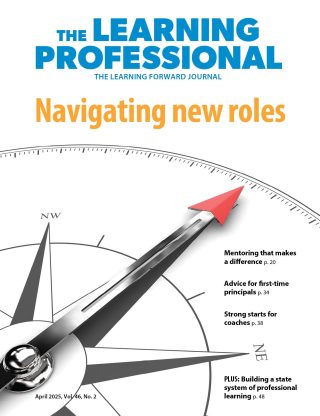IDEAS
How Much Support Is Enough?
3 tools help us know when to step in and when to back off
By Leslie Patterson and Carol Wickstrom
February 2017
Vol. 38 No. 1
Read the remaining content with membership access. Join or log in below to continue.
Sed ut perspiciatis unde omnis iste natus error sit voluptatem accusantium doloremque laudantium, totam rem aperiam, eaque ipsa quae ab illo inventore veritatis et quasi architecto beatae vitae dicta sunt explicabo. Nemo enim ipsam voluptatem quia voluptas sit aspernatur aut odit aut fugit, sed quia consequuntur magni dolores eos qui ratione voluptatem sequi nesciunt. Neque porro quisquam est, qui dolorem ipsum quia dolor sit amet, consectetur, adipisci velit, sed quia non numquam eius modi tempora incidunt ut labore et dolore magnam aliquam quaerat voluptatem.
Leslie Patterson (leslie.patterson@unt.edu) is co-director of North Star of Texas Writing Project. Carol Wickstrom (carol.wickstrom@unt.edu) is a professor at the University of North Texas and director of North Star of Texas Writing Project. Both are associates with the Human Systems Dynamics Institute.
For more information about Adaptive Action, see www.hsdinstitute.org/resources/adaptive-action.html.
References
Buckner, A. (2005). Notebook know-how: Strategies for the writer’s notebook. Portland, ME: Stenhouse Publishers.
Davis, B. & Sumara, D. (2006). Complexity and education: Inquiries into learning, teaching, and research. Mahweh, NJ: Lawrence Earlbaum.
Eoyang, G.H. (2002). Conditions for self-organizing in human systems (Doctoral dissertation, Union Institute & University, Cincinnati, Ohio, 2002).
Eoyang, G.H. & Holladay, R. (2013). Adaptive Action: Leveraging uncertainty in your organization. Palo Alton, CA: Stanford University Press.
Kittle, P. (2008). Write beside them: Risk, voice, and clarity in high school writing. Portsmouth, NH: Heinemann.
Patterson, L., Holladay, R., & Eoyang, G. (2013). Radical rules for schools: Adaptive Action for complex change. Circle Pines, MN: Human Systems Dynamics Institute.
Patterson, L., Wickstrom, C. & Araujo, J. (2010, June). Culturally mediated writing instruction for adolescent English language learners (Final Report). Berkeley, CA: National Writing Project.
Patterson, L., Wickstrom, C., Roberts, J., Araujo, J., & Hoki, C. (2010). Deciding when to step in and when to back off. The Tapestry Journal, 2(1), 1-18.
Pearson, P.D. & Gallagher, M.C. (1983). The instruction of reading comprehension. Contemporary Educational Psychology, 8(3), 317-344.
Ricca, B. (2012). Beyond teaching methods: A complexity approach. Complicity: An International Journal of Complexity and Education, 9(2), 31-51.
Recent Issues
LEARNING DESIGNS
February 2025
How we learn influences what we learn. This issue shares essential...
BUILDING BRIDGES
December 2024
Students benefit when educators bridge the continuum of professional...
CURRICULUM-BASED PROFESSIONAL LEARNING
October 2024
High-quality curriculum requires skilled educators to put it into...
LEARNING TO PIVOT
August 2024
Sometimes new information and situations call for major change. This issue...












